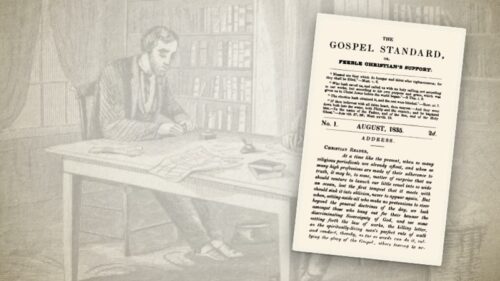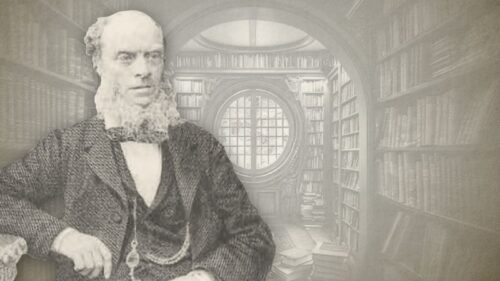The Gospel Standard
A High-Calvinist Magazine “The Gospel Standard; Or Feeble Christian’s Support” started in 1835 by a printer named John Gadsby (1808-1893). This was the son of William Gadsby (1773-1844), whose aim it was to support and promote the gospel labours of his father. Referring to the origin of the magazine, John wrote: "I suggested to my father that we ought to have a magazine of our own. He was quite startled, and said, 'Jack!' (he mostly called me Jack), ‘you cannot afford it. You will lose money by it.' “‘I quite expect so,’ I replied, ‘but that is of no consequence for the Lord has given me a good business, as you know. We ought to have a magazine.' “He took time prayerfully to consider, and then said, ‘Well, if you begin, I will try and help you, and I hope our labours will not be in vain.' “Now, without his help, I could not have commenced. He, therefore, was the founder. I was only the originator.” William and John were the first editors, followed by others among which were John M’Kenzie (?-1849), Joseph Philpot (1802-1869), Grey Hazlerigg (1818-1912), Charles Hemington (1830-1904), Joseph Hatton (1821-1884), James Dennett (1828-1900), James Popham (1847-1937), John Gosden (1882-1964) and Benjamin Ramsbottom (1929–2023). In 1878, the Gospel Standard Aid and Poor Relief Societies acquired ownership of the magazine, the trustees of these organizations referred to as the Gospel Standard Committee. A Directory was also included, whose “ministers and churches have signified their adherence to the fundamental enrolled Articles of Faith of the Gospel Standard Societies. This embodies separation from all Strict Baptists who do not hold as essential these Articles, and it is expected that the solemn subscription and its implications will be honoured by all whose names appear, by loyalty to our distinctive position as a body of Churches.”
-
Andrew Fuller Split The Particular Baptist Denomination
The Works of Andrew Fuller; very large hardback; 1012 pages; price £27; published by The Banner of Truth Trust, and obtainable from Christian bookshops. We must confess we were rather surprised that Banner of Truth should publish the works of the renowned Baptist minister, Andrew Fuller (1754-1815). As is well known, the publication of Fuller’s The Gospel Worthy of All Acceptation in 1785 split the old Particular Baptist denomination in two. There were many like Gadsby, Warburton, Kershaw and Philpot who rejected Fuller’s teaching (and interestingly, with this section a wonderful time of spiritual prosperity followed).
-
A Review: “Infant Baptism Demonstrated To Be Reasonable, Historical And Scriptural”, By James Malcom
MR. MALCOLM comes before his readers fully persuaded in his own mind that he has swept the ground from under the feet of the poor Baptist at last, and left him prostrate on the earth. But why all this determined opposition to a plain truth? Why so much zeal and warmth is there manifested in an old and oft-exploded argument? The whole strength of the arguments brought forward in the work before us is the old, erroneous idea that baptism came in the room of circumcision.
-
A Review: The National Synod Of The Belgic Reformed Churches, Held At Dort, In The Years 1618 and 1619
We conscientiously object to an established church in any form, believing that such establishments are unscriptural, and always have proved themselves to be, more or less, persecuting bodies. These religious formations stand opposed to the separate, independent churches formed by the apostles under the guidance of the Holy Spirit. Every true church is complete in itself.
-
Religion In America
[In the Memoir of Mr. Kershaw, page 385, allusion is made to Mr. Kershaw's "faithful friend and servant" (Jane). The following letter is from her, she having married after Mr. K.’S death.] Dear Mr. Gadsby, As dear Mrs. Kershaw said in her last letter that you "always asked very kindly after me," I take the liberty of writing you a few lines. I thank you for your kind inquiries. It is pleasant to think we are not entirely forgotten by those we so highly esteem in the bonds of the gospel, although, in the providence of God, so far removed from them and so unworthy of their thoughts. I often feel "like a sparrow alone upon the housetop.'' If we could meet with any to…
-
History Of The “Gospel Standard”
Before a man sits down to write a history of any place or thing, he should be quite satisfied on two points: 1, That he is qualified for the work; and, 2, That people in general will believe he is so qualified; otherwise his labour will be in vain. Gibbon wrote "The Decline and Fall of the Roman Empire;" most ably written, but so tinctured with infidelity that we dare not put it into the hands of our children. Macaulay wrote a "History of England;" one of the most elegantly-written works in the English language; but his Essay on Lord Clive is so marred with partiality and bigotry that we turn from it with disgust. In one place he calls the immortal Huntington "a worthless,…
-
How Do We Discern The Lord’s Guidance?
It is well for those who are duly sensible of their own weakness and fallibility, and of the difficulties with which they are surrounded in life, that the Lord has promised to guide his people with his eye, and to cause them to hear a word be hind them, saying, "This is the way, walk ye in it," when they are in danger of turning aside either to the right hand or to the left. For this purpose he has given us the written word to be a lamp to our feet, and encouraged us to pray for the teaching of his Holy Spirit, that we may rightly understand and apply it. It is, however, too often seen that many widely deviate from the path…



